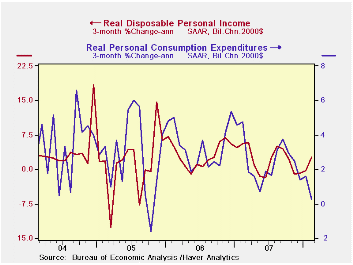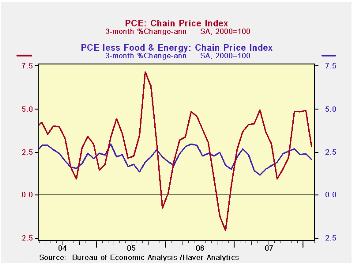 Global| Mar 28 2008
Global| Mar 28 2008U.S. Real DPI Up 0.3%, Real PCE Flat, Prices Easy
by:Tom Moeller
|in:Economy in Brief
Summary
Nominal personal income grew 0.5% last month and beat Consensus expectations for a 0.3% gain. The rise lifted the three-month growth in income to 4.8%, its best since September. Wage & salary income moderated a bit and rose 0.3% after [...]

Nominal personal income grew 0.5% last month and beat Consensus expectations for a 0.3% gain. The rise lifted the three-month growth in income to 4.8%, its best since September.
Wage & salary income moderated a bit and rose 0.3% after January's 0.5% increase. Factory sector wages rose 0.3% (+0.4% y/y) and wages & salaries in the private service-providing industries rose 0.3% (3.9% y/y). That y/y increase is much reduced from the 6.4% gain last year as well as from the 6.8% 2006 rise. Wages in the government sector rose a strong 0.5% (5.1% y/y) but here the story is one of acceleration after a 4.6% rise last year and a 4.1% 2006 increase.
Lower interest rates caused the fifth straight monthly decline in interest income (+3.6% y/y). That y/y increase was less than one third the rate of gain at the end of 2005. Dividend income rose another firm 0.6% (11.5% y/y), a double digit rate of gain that is down somewhat from its peak 16.3% in 2006.
Disposable personal income growth improved last month to 0.5% which was its best increase since last August. The rise followed 0.4% gains during the prior two months. It raised the thee month growth rate to 5.5% (AR). Adjusted for prices, which moderated, real disposable income rose 0.3% and the three month growth rate picked up to 2.6%.
Personal consumption expenditures rose just the expected 0.1%. Real personal consumption expenditures were flat. That lowered the three-month growth rate to 0.3%, its worst since October 2005.
Real spending on discretionary items continued weak. Motor vehicle & parts purchases did rise 0.3% but three month growth fell to -7.4%. Real spending on household furniture & appliances also rose 0.3%, as it did in January, but three month growth fell to -2.1%. Real spending on apparel rose 1.4% however because of a sharp decline in December, three month growth improved only to -1.5%. These and other detailed spending figures are available in Haver's USNA database.
The PCE chain price index rose just 0.1% as energy prices fell 1.9%. The core PCE price index matched expectations and rose just 0.1%. The three month growth in prices fell to 2.1%, down from the three month gains of 2.7% registered last year.
The personal savings rate improved somewhat to all of 0.3% from the negative 0.1% during January.
Yesterday's speech by Fed GovernorFrederic S. Mishkin on inflation titled Comfort Zones, Shmumfort Zones can be found here.
| Disposition of Personal Income (%) | February | January | Y/Y | 2007 | 2006 | 2005 |
|---|---|---|---|---|---|---|
| Personal Income | 0.5 | 0.3 | 4.6 | 6.2 | 6.6 | 5.9 |
| Disposable Personal Income | 0.5 | 0.4 | 4.7 | 5.7 | 5.9 | 4.7 |
| Personal Consumption | 0.1 | 0.4 | 5.1% | 5.5 | 5.9 | 6.2 |
| Saving Rate | 0.3 | -0.1 | 0.9 (Feb. 07) | 0.4 | 0.4 | 0.5 |
| PCE Chain Price Index | 0.1 | 0.3 | 3.4 | 2.5 | 2.8 | 2.9 |
| Less food & energy | 0.1 | 0.2 | 2.0 | 2.1 | 2.2 | 2.2 |
Tom Moeller
AuthorMore in Author Profile »Prior to joining Haver Analytics in 2000, Mr. Moeller worked as the Economist at Chancellor Capital Management from 1985 to 1999. There, he developed comprehensive economic forecasts and interpreted economic data for equity and fixed income portfolio managers. Also at Chancellor, Mr. Moeller worked as an equity analyst and was responsible for researching and rating companies in the economically sensitive automobile and housing industries for investment in Chancellor’s equity portfolio. Prior to joining Chancellor, Mr. Moeller was an Economist at Citibank from 1979 to 1984. He also analyzed pricing behavior in the metals industry for the Council on Wage and Price Stability in Washington, D.C. In 1999, Mr. Moeller received the award for most accurate forecast from the Forecasters' Club of New York. From 1990 to 1992 he was President of the New York Association for Business Economists. Mr. Moeller earned an M.B.A. in Finance from Fordham University, where he graduated in 1987. He holds a Bachelor of Arts in Economics from George Washington University.
More Economy in Brief
 Global| Feb 05 2026
Global| Feb 05 2026Charts of the Week: Balanced Policy, Resilient Data and AI Narratives
by:Andrew Cates






